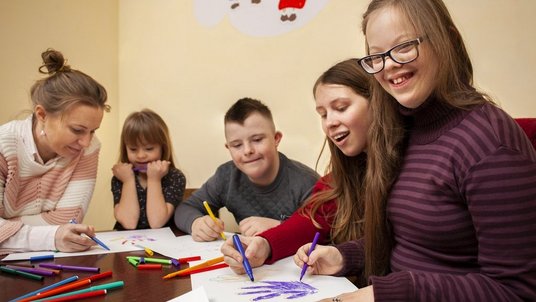

In its work the OeAD is committed to the principle of dealing with diversity and difference in an inclusive way. Based on these principles, the OeAD designs its activities and programmes with the objective of facilitating equal access to education, culture and the arts for all. Respecting people’s diversity and difference, valuing their individuality and personality, and supporting and promoting the potential of each individual are basic pillars of this work. This mission is reflected in our work programmes and in the selection of our target groups.
It is therefore a matter of particular concern to us that our projects in the field of education make as great a contribution as possible to promoting equal access to high-quality education for all while taking into account the diversity and difference of each individual.
We also place a particular focus on projects that support educational developments aimed at strengthening equity and social inclusion.
Project example: SEN (Special Educational Needs) – the road to inclusive schools in the Republic of Moldova
Inclusive education is now firmly anchored in the strategies and the national legislation of the Republic of Moldova. However, in order to achieve long-term improvements in access to education and the quality of education for children with special needs there is still a great need for support in the implementation. An important part is played by the psychosocial service offices and their national coordination centre (Moldovan Centre for Psycho-Pedagogical Assistance), which provide local support for school inclusion in each of the 35 districts of Moldova. Building on the results of the predecessor projects, the exchange of experience with Austria and the expertise in the field of inclusion are now used to further strengthen the capacities and functioning of the national coordination centre and all 35 service offices. The Moldovan Centre for Psycho-Pedagogical Assistance is supported in its efforts to promote the continuous standardisation and improvement of the services offered by the service offices and to ensure their quality. The specialists in the service offices are trained so that they can contribute competently and professionally to successful school inclusion through their counselling activities at the schools and direct work with the children and young people with special needs and their environment. Austrian experts work with their Moldovan colleagues in specialist training on the subjects of visual impairment, hearing impairment, and autism. Publications on this subject are also published in the Romanian language.
Project example: GENDER: Facilitating girls’ access to technical occupations in Albania
In Albania as well as in Austria girls are under-represented in technical occupations. Only 18% of all pupils in vocational schools in Albania are female. The IT sector, a technical field with good labour market opportunities and relatively high income levels, is an important area that lends itself to measures for increasing girls’ access and participation. To this end, workshops on how to appeal to girls and their parents and raise interest in IT education are held at 16 Albanian vocational schools that also offer technical training in the IT sector. In the workshops teachers are intensively trained on gender concepts, gender-sensitive teaching methods, and the development of a gender-sensitive school culture and are supported in developing gender-sensitive marketing materials, activities, and projects. An action plan for all schools is developed and will be implemented at the respective school locations.
Project example: Equity Scan
In order to raise the equity relevance of our projects each of them has to undergo a so-called “equity scan”.


